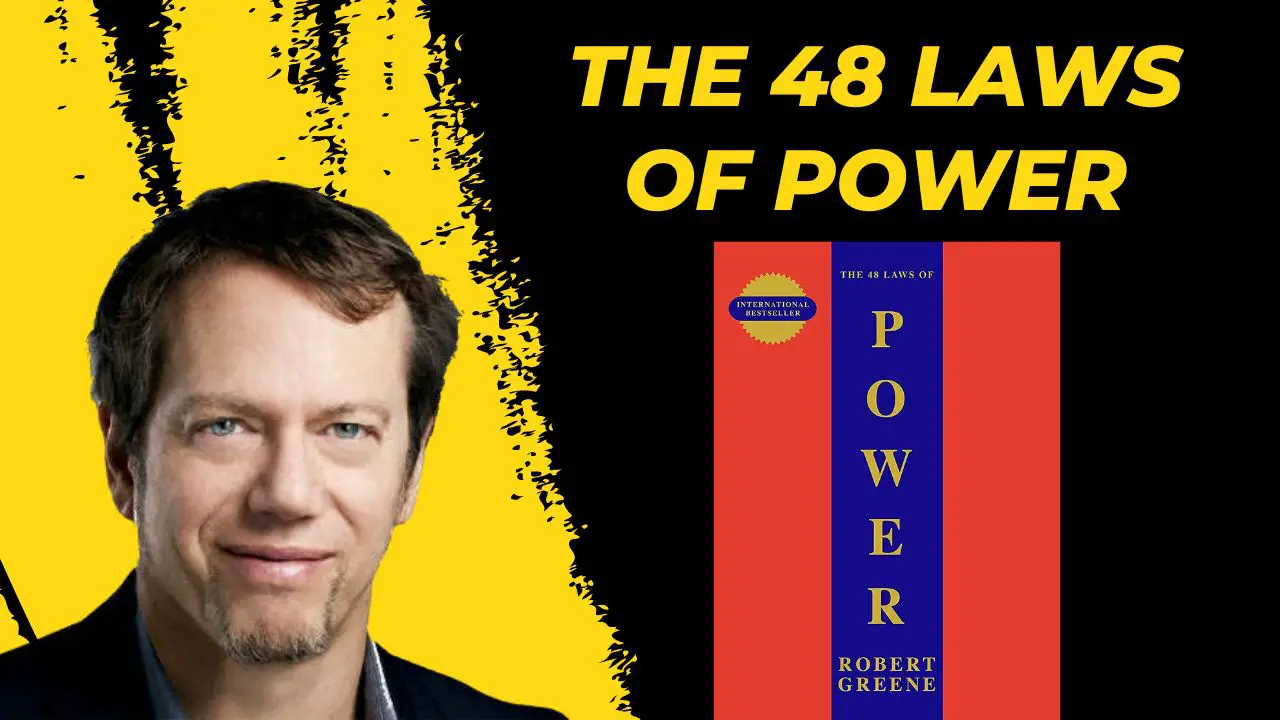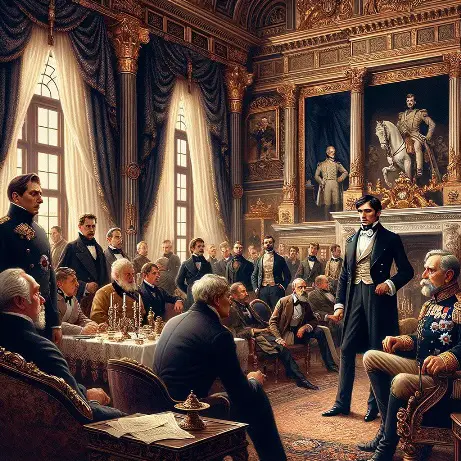The quest for power is timeless. Humans constantly try to get control, influence, and authority over others in the office, boardroom, church, or classroom.
But how is power gained, lost, and maintained in all aspects of life? That’s what seasoned author Robert Greene unravels in his classic The 48 Laws of Power.
Since its release in 1998, this has become a bible for millions, from executives and entertainers to politicians.
The 48 Laws examines the shady social game of power by profiling the tactics and habits of its greatest historical practitioners.
This blog post will summarize Robert Greene’s 48 Laws to help you be smart, make good plans, and defend yourself.
Show you the timeless keys to dominance, deception, charm, and intimidation, tools that work for both the lion and the fox.
You’ll also find examples of successful power plays and failures by famous people who ignored key laws.

- The 48 Laws of Power Book Chapter Wise Summary
- Law 1 Never Outshine The Master
- Law 2 Never Put Too Much Trust In Friends, Learn How To Use Enemies
- Law 3 Conceal Your Intentions
- Law 4 Always Say Less Than Necessary
- Law-5 So Much Depends On Reputation-guard It With Your Life
- Law-6 Court Attention At All Cost
- Law-7 Get Others To Do The Work For You, But Always Take The Credit
- Law-8 Make Other People Come To You-use Bait If Necessary
- Law 9: Win Through Your Actions, Never Through Argument
- Law-10 Infection: Avoid The Unhappy And Unlucky
- law-11 Learn To Keep People Dependent On You
- Law-12 Use Selective Honesty And Generosity To Disarm Your Victim
- Law-13 When Asking For Help, Appeal To People’s Self-interest, To Their Mercy Or Gratitude
- Law-14 Pose As A Friend, Work As A Spy
- Law-15 Crush Your Enemy Totally
- Law-16 Use Absence To Increase Respect And Honor
- Law-17 Keep Others In Suspended Terror: Cultivate An Air Of Unpredictability
- Law-18 Do Not Build Fortresses To Protect Yourself- Isolation Is Dangerous
- Law-19 Know Who You’re Dealing With-Do Not Offend The Wrong Person
- Law-20 Do Not Commit To Anyone
- Law-21 Play A Sucker To Catch A Sucker-seem Dumber Than Your Mark
- Law-22 Use The Surrender Tactic: Transform Weakness Into Power
- Law-23 Concentrate Your Forces
- Law-24 Play The Perfect Courtier
- Law-25 Re-create Yourself
- Law 26: Keep Your Hands Clean
- Law 27: Take Advantage of People’s Need to Believe
- Law 28: Act with Boldness, Not Timidity
- Law 29: Plan Until You Reach the End
- Law 30: Make your Accomplishments Seem Effortless
- Law 31: Make Others Play with the Cards You Deal
- Law 32: Play to Others’ Fantasies
- Law 33: Discover Others’ Weaknesses
- Law 34: If You Want to Be Treated Like a King, Act Like One
- Law 35: Master the Art of Timing
- Law 36: Ignoring What You Cannot Have Is the Best Revenge
- Law 37: Create Compelling Spectacles
- Law 38: Think Whatever You Want, But Behave Like Others
- Law 39: To Catch More Fish, Stir Up the Waters
- Law 40: Despise the Free Lunch
- Law 41: Avoid Stepping Into a Great Man’s Shoes
- Law 42: Take Down the Shepherd and the Sheep Will Scatter
- Law 43: Work on the Hearts and Minds of Others
- Law 44: Use the Mirror Effect to Disarm
- Law 45: Preach the Need for Change, But Make Change Gradual
- Law 46: Do Not Appear to Be Too Perfect
- Law 47: In Victory, Learn When to Stop
- Law 48: Be Formless
- 48 Laws of Power Summary Pdf
The 48 Laws of Power Book Chapter Wise Summary
Robert Greene’s masterful book dissects power chapter by chapter into 48 must-know “laws”, from Law #1: “Never Outshine the Master” to Law #48: “Assume Formlessness”.
Find out how to make people feel special and how having too much confidence can be dangerous. Read stories about famous people who were hurt by not following these rules.
Will you become famous or not? Find out how to get power that’s still affecting the world, how to spot power scams, and what mistakes to avoid.
Let’s explore…
Law 1 Never Outshine The Master
This law states that we should never try to show that we are more talented than our masters like Nicolas Fouquet did.
Nicolas Fouquet XIV was the finance minister of his reign. When the prime minister died, he thought that the king would make him the next minister, but he abolished that position instead.
So, to impress the king, he threw the most spectacular party the world had ever seen.
The party started with a lavish seven-course dinner. There were so many brilliant-minded people, and music and fireworks were thrown at the end to honor the king.
But to his amazement, the king’s musketeer arrested him the next day.
Interpretation
After the night party, the king was jealous of his minister because he had never been able to throw such a party himself.
So he sent his musketeers the next day to arrest Fouquet because he stole from the treasury three months ago.

Read the Power Of Intention book summary to learn how to use intention to achieve your goals and live a happy life.
Law 2 Never Put Too Much Trust In Friends, Learn How To Use Enemies
As the law itself says, we should never put too much trust in a friend because if he/she is a cunning friend, then he/she will definitely use you for his/their profit. But you can certainly trust an enemy because he/she can break your trust once, but not twice.
Let’s understand this by an example—when a prince (Michael lll) was handed over the throne of the Byzantine Empire, he was confused as to whom he should give the post of chief councilor. At that precise moment, he thought of his friend (Basilius) whom he had given education and the post of a horse trainer several years ago.
Now, he could be trained to become a chief councilor. The newly made king refused a highly ambitious man, ‘Bardas’ (his uncle), as the chief councilor and gave his friend that post.
When Basilius became powerful enough to control the army, he had more money than the king, so he and his army killed the king.
Interpretation
Once someone gets the taste of success and power, he/she forgets the favors he/she has received and imagines they have earned their success by his/her merits.

Law 3 Conceal Your Intentions
This law says that we should never reveal our intentions or the purpose behind our actions. Because if our enemies or friends don’t know what we’re up to, they can’t plan to make us fail.
Do something else and show them something else so that they cannot figure out what you’re doing.
Create a misleading path for those who want to snatch your success. Sometimes, it’s challenging to monitor your tongue and not blurt out your opinions and reveal your plan.
Some people also think that revealing their plans wins people’s hearts, but on the contrary, they create more competitors for themselves.
Know More: 50 Best Self Help Books Of All Time
Law 4 Always Say Less Than Necessary
You’re breaking the third law if you say more than necessary. So, say less and do more.
Powerful people also impress their fans by saying less. This saves them embarrassment because the more they say, the more likely they are to say something foolish.
The more you keep silent, the more people become uncomfortable. The more uncomfortable they become, the easier it is for you to hide your intention.

Learn the 80/20 Principle and How to Use It to Become Happy and Blessed.
Law-5 So Much Depends On Reputation-guard It With Your Life
There was once a kingdom whose king’s general governor was Chuko Liang. After a fight, Chuko Liang and his handful of soldiers decided to rest in a small town. But suddenly, a soldier came running towards him with the alarming news that Sima Yi (another ruler of a different kingdom) had approached with an army of 150,000.
Instead of complaining about his situation, he ordered his troops to remove their flag, open the city gate, and hide.
Then he sat on the most visible part of the wall wearing a Taoist robe, lit some incense, and began to chant. After a while, Sima Yi appeared with his army. He was hesitant and retreated with his army.
Interpretation
Chuko Liang was also known as the ‘sleeping dragon’ and had a reputation as the cleverest man in China.
So, when Sima Yi came to attack him, he was reluctant to pass through the gate because he thought it was a trick made by Chuko Liang to capture him, so he retreated.

Law-6 Court Attention At All Cost
In this law, the author says that we should try to become a magnet of attention if we want to gain power and fame. Make yourself look more mysterious.
There is a famous Indian fable named The Wasp and the Prince. Let’s understand this law by that Indian fable. A wasp named Pin Tail was on a quest to become famous, so he entered a palace and stung the prince. The Prince woke up crying and told the king that a wasp, liece, or maybe a bed bug had stung him while sleeping.
So, the king sent some courtiers to catch whoever was causing the prince discomfort. But the wasp stung everyone who tried to catch him in this way; he became famous, and before he died, he said, “A name without fame is like fire without flame. There is nothing like attracting attention at any cost.
Interpretation
Even though this fable tells us to become famous, we should never harm anyone else to become famous, as the wasp hurt the prince.

Law-7 Get Others To Do The Work For You, But Always Take The Credit
Once, a tortoise met an elephant on his way, but the elephant told him, “Out of my way, coward, I might step on you!” but the tortoise was bold and stayed where he was.
The elephant tried to crush him, but he couldn’t because the tortoise shell was so hard that it wouldn’t break easily, and then the tortoise said, “Do not boast, Mr. Elephant, I am as strong as you are!”
So, after that, he asked the elephant to come to his hill the next day to test who was more powerful. Before sunrise the next morning, the tortoise ran down the hill near the river, where he found a hippopotamus.
The tortoise said, “Mr. Hippo! Shall we have a tug-of-war? I bet I’m as strong as you are!” Then he gave one end of the rope to the hippo and told him that after he called “hey!” he should start the match. Then he went up to the hill, where he found the elephant waiting. And so, he told him to hold the other end of the rope and told him the same thing that he asked the hippo to do.
Then he went half the way down to the hill and exclaimed, “Hey!” Then, both of them started pushing the rope towards each other but couldn’t budge each other because they were of equal strength. Thereafter, he went to both of them individually, and they mutually agreed that he was strong. This shows us that he made others do his work and took the credit for being strong.

Law-8 Make Other People Come To You-use Bait If Necessary
If you want to become famous, you should learn how to attract people to you. If you think you can attract people to yourself, use someone like Filippo Brunelleschi, the great Renaissance artist.
Although he already knew how to attract people to him as a sign of power, he was assigned to repair the dome of Santa Maria del Fiore cathedral in Florence on one occasion.
Along with him, one more architect was assigned: Lorenzo Ghiberti. But Brunelleschi didn’t like the idea of Ghiberti working with him because he knew that he was lazy, and he wouldn’t do any work, and he would be the one who had to do all the work, but still, Ghiberti would get half credit if the dome was built.
So, Brunelleschi pretended to be ill and didn’t come to work for several days. Soon after that, some officials (the officials who appointed him) came to him, begging him to return because they realized that Ghiberti was useless and lazy, and they fired him.
After some days, Brunelleschi again pretended to recover and came to work. This example proves that “make other people come to you.”
Want to know a new way of thinking about mornings that has made people’s lives better worldwide? Then Read Miracle Morning Book.
Law 9: Win Through Your Actions, Never Through Argument
There was once a vizier who served 30 years of his life to his master. But his loyalty and honesty made the courtiers his enemies. They started conspiring against him. They spread fake stories about his duplicity to the king as well. These attempts really worked, and the king gave him the punishment that he would be tied and fed to his fiercest dog.
But before that, he can ask for his last wish, and so, he replies that he wants to go home for the last ten days of his life and pay his debts, take the money that someone else has borrowed from him, and appoint a guardian for his children’s.
After the king ensured he wouldn’t escape, he permitted him to go home. Soon, he reached his home and rushed to grab one hundred gold pieces. He then paid a visit to the huntsman who kept the dog and gave him the coins in exchange for caring for the dog.
He cared for the dog for 10 days, and they soon became friends. He was amazed to see that instead of eating the vizier, the dog was wagging his tail around the tied vizier. When the king asked the vizier why he behaved this way, he replied that he had looked after the dog for 10 days. The sultan had seen the result for himself.
I have looked after you for 30 years, and what is the result? I am condemned to death based on an accusation made by my enemies. After hearing this, the king felt ashamed and rewarded the vizier with a fine cloth set. He also handed the courtiers who had conspired against him, but he set them free.
Interpretation
The vizier never argued for his punishment to the king; if he had argued by chance, the situation could have become worse, so he took care of the dog instead.

Law-10 Infection: Avoid The Unhappy And Unlucky
In this law, the author states that people spread their unhappiness to others like an infection.
He says we should avoid these people because we always think we are helping them, but we don’t realize that they are also making us miserable.
For example, if you’re helping a drowning man, then due to his weight, you could also get drowned away. The weight here refers to his unhappiness, which could also infect you with his unhappiness, making you drown with him as well.
That’s why the author says that unfortunate people draw misfortune to themselves and may draw it to you if you associate with them.
READ It To Find True Happiness And Purpose of Life: Ikigai Book Summary (With Pdf)
law-11 Learn To Keep People Dependent On You
If people depend on you, they will never want to lose you because they know that you are the only source of profit for him/her.
You can understand this by the example of Otto Von Bismarck, who became the deputy in the Prussian parliament in 1847. He was 32 years old at that time. At that time, the parliament liberals were in power and King Frederick William IV was at a low point, but Bismarck, rather than joining with the parliament, helped the king regain his power.
After the king came into power, he made him a minister in his king’s cabinet. After several years, when he finally died in 1861, his brother William took over the throne. He disliked Bismarck, but he also knew that he was loyal to his brother and saved him once, so he gave him the post of prime minister. After getting this job, he quarreled about the policy with his king. But the king realized he was dependent on him.
After several years, Bismarck forced the king to get him crowned, and he became the king and united several German states into a country.

Law-12 Use Selective Honesty And Generosity To Disarm Your Victim
In 1926, Count Victor Lustig visited the most feared gangster, Al Capone. He courteously and sincerely told the gangster that if he gave him $50,000, he would double it in 60 days.
Although Copone never gives large sums of money to a stranger, something is different about Lustig and his voice’s note of honesty and generosity. So, he finally gave him the $50,000. Lustig went to Chicago, kept the money in a safe deposit, and went to New York, where he had other money schemes.
He came after 2 months and paid a visit to Capone with his money. He apologized that he could not double it due to a problem and handed over the money to him. At first, he was furious, but later, he rewarded $5,000 for his honesty even though he was not honest at all, and it was his plan that by showing fake honesty, he would gain some profit.
Want To Know How To Get Blessed With Money And Happiness? Read This. The Richest Man In Babylon Book Summary
Law-13 When Asking For Help, Appeal To People’s Self-interest, To Their Mercy Or Gratitude
Once, an apple tree was in a peasant’s garden, but it bore no fruit; still, it was a home for several birds and grasshoppers. One day, the peasant decided to cut down the tree, and he stroked the tree’s roots with his axe.
The animals living on the tree pleaded with him not to cut it down, and in return, they would sing for him. But he paid no attention to their words but gave the tree a second and a third blow. When he reached the hollow, he found a beehive full of honey. After tasting the delicious honey, he took great care of the tree to restore it for his self-interest. That’s why self-interest alone moves some men.

Law-14 Pose As A Friend, Work As A Spy
You can understand this by the example of Joseph Duveen, who knows this art very well and has been using it from 1904 to 1940. His goal was to monopolize millionaires in his art-collecting market, and he almost did that also by befriending them and making them his regular clients, but only one millionaire was left whom he had not monopolized, and he was Andrew Mellon.
Even though some of his friends told him it was impossible, he was determined to make him his client and told his friends that he would make Mellon buy from him and only from him.
He even sent some of his people to spy on him and learn about his habits and hobbies. He waited until Mellon visited London in 1921 and stayed in the Claridge Hotel. Duveen also booked a room on the second floor just below Mellon’s.
He also sends his valet (a person who parks cars at a hotel or restaurant) to befriend Mellon’s valet and get additional information about Mellon. After some time, his valet informs him that Mellon is visiting the National Gallery. He thinks this is the best chance to make him his friend.
So he rushed towards Mellon’s spot and started talking about going to the national gallery. This at first dazzled him, but later, he was amazed that his and Duveen’s tastes were almost the same.
Duveen was successful in befriending him, and in later years, Mellon was one of his best and most generous clients.
Is your mind holding you back? Use your subconscious mind to reach your full potential.
Law-15 Crush Your Enemy Totally
This law explains to us that we should crush or finish our enemy totally; otherwise, he/she will come back again to take revenge with a much greater force, and maybe this time, your enemy may crush you instead of you crushing him/her.
You can understand this by the example of two Chinese rivals, Hsiang Yu and Liu Pang.
- Hsiang Yu believes in violence and power, and he is also a mighty warrior,
- Liu Pang is not much of a warrior but is the best at devising good strategies.
One day, the king ordered them to capture the capital (Hsien-Yang) of the kingdom, Ch’in. The king divided his army into two: one under the leadership of Sung Yi and Hsiang Yu, who were commanders, and one under the leadership of Liu Pang, who was heading to Hsien-Yang from the south.
On the way, Sung Yi hesitated to lead the army into the capital, but as Hsiang Yu’s nature was violent, he called Sung Yi a traitor, cut off his head, and took command of the entire army.
He was also impatient and didn’t want Liu Pang to reach the capital first, but he was amazed to see that he had already captured the capital with his troops.
Hsiang Yu’s adviser, Fan Tseng, advised him to kill Liu because Liu could be his biggest competitor. Liu used to be greedy only for riches, but since entering the capital, he has not been distracted by wealth, which means he is aiming high. But Yu insisted that he would cut off his head in the celebratory sword dance.
Later, when Lui entered the party, he sensed that something was wrong because Yu was hesitating to do something, and he escaped. Hsiang Yu searched for him for several years, and he finally found him, but he decided to be merciful because he wanted to take him to the kingdom so he could get his former friend to acknowledge him as the master of Ch’in and this time also he didn’t listen to his adviser who was telling him to kill Liu instantly, but Liu again escaped when they were negotiating.
Then, after a few weeks, when Yu was hunting with his forces, he unwisely scattered his army. Then, after getting a chance, Liu attacked him and killed him.
Do you want to know how habits develop? The Hooked Book summary by Nir Eyal shows the secrets behind habit-forming products.
Law-16 Use Absence To Increase Respect And Honor
In those times when Assyrians ruled the upper Asia, the people of Medea (northwestern Iran) revolted against them and made a separate country. They didn’t want any monarchy or government, and as a result, the country was divided into states, and states were divided into villages and started fighting with each other.
Wherever your vision can see is chaos and confusion. So, at that time, a man named Deioces started settling disputes for his village and as he became famous, the people from other villages also started coming to him to settle their disputes because every other judge in the country was corrupt and distrustful.
So, when he reached the height of his power, he retired, and the country fell into chaos again. Thereafter, the people of Medes held a meeting, and a wise tribal said, ”Let us appoint one of our members to rule so that we can live under an orderly government rather than lose our homes altogether in the present chaos.”
So, after this discussion, they decided to set up a monarchy, and of course, Deioces was made the king after so much pleading, but he put some conditions on it and that was to build him a palace with guards and only selective people could meet him and all his wishes were granted. He ruled for the next 53 years.
Interpretation
Deioces always knew that if he retired at the heights of power, the country would fall into chaos due to his absence, and that’s what happened. People started realizing they needed someone to rule the country, and who could be a better option than Deioces?

Law-17 Keep Others In Suspended Terror: Cultivate An Air Of Unpredictability
This means that you should always show something else and do something else because this creates confusion for your enemy cause he will no longer be able to predict your next moves.
Like Pablo Picasso, he always sold his paintings to an art dealer named Paul Rosenberg, and he always gave him a fair price for his paintings. However, suddenly, he said that he couldn’t sell his work to him anymore.
He was very anxious for the first two days and couldn’t predict why Picasso was not selling his paintings. On the third day, he came up to Picasso with a substantially higher figure than usual to buy his paintings, and that’s what Picasso wanted.
Law-18 Do Not Build Fortresses To Protect Yourself- Isolation Is Dangerous
Even though the idea of hiding or isolating us in a fortress seems safe, it actually isn’t because communication keeps us updated about our enemies, but if we cut off the source of communication about the outside world, we won’t be able to survive the evils of it later.
Keeping ourselves social when needed helps us in many ways. For example, we can check what enemies are doing against us, what strategies they plan to execute, and more.
If we know all this, then we can make a better strategy than theirs and even defeat them in times of war. So, by this, we know that it’s better to dilute ourselves with the crowd rather than hide in a fortress because it makes us a clear target for enemies to reach and kill us.
Explore the secret to living in the present moment and unlock true happiness. Read our summary of The Power of Now by Eckhart Tolle.
Law-19 Know Who You’re Dealing With-Do Not Offend The Wrong Person
There are so many people in this world, and they are all unique in their own way and have different ways of perceiving you; on that base, they give their opinions.
So, likewise, they can also react differently to the same sentence you said. In conclusion, we can say that some people may be impressed with you, and some can be offended too. You have to decide how to act accordingly because, on the battlefield, you don’t recite a poem in front of a warrior and show attacking skills in front of a poet.
Let’s understand this law by the fable named “The Crow and the Sheep.” Once, a mischievous crow sat on the back of a sheep. It didn’t matter how much the sheep tried to get him off, but he always returned. At last, the sheep said to him, ”if you had treated a dog in this way, you would have had your desserts from his sharp teeth.” And to this, the crow replied, ”I despise the weak and yield to the strong. I know whom I may bully and whom I may flatter, and thus, I hope to prolong my life to a good old age.”
Interpretation
This crow knows how to differentiate between different people (the sheep and the dog) and how to act differently (to despise the weak people and flatter those who are stronger than him).

Law-20 Do Not Commit To Anyone
Once upon a time, the kites and crows agreed that whatever they found in the jungle to eat would be shared equally. One day, they found a wounded fox lying helplessly on the floor.
After seeing this, the crows replied that they would take his head, and the kites also agreed that they would take the bottom half of the fox, but just then, the crows replied that they thought that kites were more intelligent than us, but it appears that they don’t even know that the head contains the delicious brain, eyeballs, and nerves.
After listening to this, the kites thought he was right and that they should take the head, so they both started fighting for the upper half of the fox’s body.
This caused them to die and the one who was left was the wounded fox who later enjoyed the dead bodies of the crows and the kites.
Interpretation
That’s why it is said not to commit or reveal your plans before executing them. If the crows had never said these words, they could have saved themselves and the kites from dying and also enjoyed their meal.
Law-21 Play A Sucker To Catch A Sucker-seem Dumber Than Your Mark
This means that we should practice the art of making other people think that they are smarter than us. You may be thinking, why shouldn’t we show them our intelligence if we are more capable than them?
The answer to this question is that it makes other people think that you are dumb and he is smarter than you, thus making him feel superior. Secondly, if you pretend to be dumb, you will be safe from future threats.
The author also says that the wisest man is one who pretends to be a fool around the fools.

Law-22 Use The Surrender Tactic: Transform Weakness Into Power
This law states that when our opponent is stronger than us, it’s best to surrender because surrendering allows you the time to make new strategies and defeat your opponent later. This also states that we should never fight for our honor when our enemy is more powerful.
Let’s understand this by using the chestnut and fig tree examples. In this story, there are two trees: one is chestnut, and the second is fig.
One person came and plucked the fig fruit and chewed it. The chestnut tree exclaimed to the fig tree that it was so unprotected, whereas he (chestnut) was safe because he was covered by a thick shell and thorns around its leaves. After listening to this, the fig tree laughed and said that he was plucked gently while the chestnut was being plucked by throwing stones on it, and it was then harshly beaten to crack open its hard shell.
This story shows us that the fig tree surrenders to humans and is thus treated softly, but when the rigid chestnut doesn’t come off, he’s beaten harshly even though he knows that humans are more powerful than him.
Law-23 Concentrate Your Forces
Once, there was a goose plucking grass on a lawn and a horse was grazing beside it. So, he went up to the horse and told him that he (the goose himself) was more perfect than the horse because he could walk on the ground, swim in the water, and also fly in the sky.
The horse replied to this, ” It is true you inhibit three elements, but you make no well-distinguished figure in any of them.
- You fly, indeed, but your flight is so heavy and clumsy that you have no right to compare yourself to a lark or a swallow.
- You can swim on the surface of waters, but you cannot live in them as fishes do; you cannot find your food in that element nor glide smoothly along the bottom of the waves.
- And when you walk, or rather waddle, on the ground with your broad feet and long neck stretched out, hissing at everyone who passes by, you attract the derision of all beholders.
I confess that I am only formed to move on the ground, but how graceful is my make! How well turned my limbs! How highly finished my whole body! How great is my strength! How astonishing is my speed? I would much rather be confirmed to one element and admired in that than be a goose in all.
This story tells us to focus all our forces on one particular field in which we are best rather than doing them all.

Law-24 Play The Perfect Courtier
This means that we should know how to flatter someone because it can be used to protect you, just like a courtier usually flatters his king.
You can understand this by the example of two dogs who first lived in a shelter. Later, they were adopted; a rich man adopted one small dog, and a poor man adopted a big dog.
After several years, the poor dog sees his old friend seated on a soft cushion. He goes up to him and asks him what sort of life he leads now. The rich dog tells him that he is really living his best life because he eats and drinks among the richest, plays all day long and sleeps on his comfortable and soft cushion when he gets tired.
After finishing his sentence, he asked the poor dog what kind of life he was living. The poor dog became sad after listening to his question and said that he didn’t get any love or attention from his master. He also guards the door day and night and sleeps at the front door without cushions.
He asked the small dog what he had done to attract the rich man. So the small dog replied that he just flattered him by standing on his two legs. So now, did you understand the power of flattering?
Want To Know How To Get Blessed With Money And Happiness? Read This. The Richest Man In Babylon Book Summary
Law-25 Re-create Yourself
Don’t act as society wants you to because they are just limiting you so that you can’t really be yourself, but make yourself into what you want, as Aurore Dupin Dudevant did.
In 1831, she left her husband and family and moved to Paris because she wanted to become a writer. However, after coming to Paris, she was exposed to the world’s harsh realities because, as a woman, you cannot do this work. If you’re really into it, your loved ones and husbands should be there for you and let you do these things.
Even when she did it all by herself and wrote a book, she was again forced to face the harsh reality of the world because her publisher rejected her book by saying that she was a female and also without a husband.
But she was determined to sell her books, so she started wearing men’s clothes and also wrote the false name ‘George Sand’ on her books. This finally worked for her and can also work for you if you use this law on yourself.
Read The Alchemist: Your passport to a world of magic and self-discovery
Law 26: Keep Your Hands Clean
Your good name and reputation are critical to your success, and they depend more on what you hide than what you show others. Never allow your image to be soiled by bad deeds or mistakes. It would help if you appeared to be powerful, civil, and efficient at all times. You must maintain a spotless appearance. Of course, everyone makes mistakes, so the way you can “keep your hands clean” is to conceal those mistakes. Find a scapegoat—whether a person, event, or object—on which to place the blame.
Similarly, don’t get your hands dirty with dirty deeds. In the Cat’s Pay fable, the monkey grabs the paw of his friend, the Cat, and uses that paw to pull chestnuts from the fire. In doing so, he can enjoy the chestnuts without risking injury to himself. If you have an unpleasant or unsavory task you must do, don’t do it yourself. Find someone to do the dangerous or dirty work for you. Let others be the apparent bad actor or bearer of bad news.
Law 27: Take Advantage of People’s Need to Believe
A prerequisite for being powerful is having a group of people who are willing to do what you want—a following, if you will. You may think it’s a huge job to create this kind of following, but it can actually be very simple.
You see, people have an instinctive and overwhelming need to believe in something (anything!). You can make yourself, or your case, the focal point of that need. Give them something to believe in and a reason to believe in it. Keep your words and promises ambiguous. Emphasize enthusiasm over prudence and clear thinking.
Give your followers rituals to adhere to and request sacrifices on your behalf. You’ll find they’re all too happy to do this, and you will have built an army of people who are at your beck and call.
Law 28: Act with Boldness, Not Timidity
Most people are timid. Most people instinctively seek to avoid conflict and tension. Most people want to be liked by as many others as possible. And, while we all fantasize about taking bold action from time to time, few of us actually do it. We are too nervous about the consequences, or about what other people will think about us. We don’t want to stir anything up or make ourselves a target.
This is timidity, even if we tell ourselves it is only practicality or concern for others. Timidity is not altruistic; it is selfish. It is a way of living that is overly caught up in thoughts about ourselves and what people think of us.
Boldness is other-oriented. Great things are accomplished by the bold, not by the timid. When you feel strongly about something, you should act boldly. That’s not to say that you should dive headfirst into an action you have not thought out or are unsure of. This will only affect your execution. Instead, act boldly towards something you feel strongly about.
Law 29: Plan Until You Reach the End
Most people think they are planning for the future and thinking ahead. But most people are wrong. They are actually forming vague plans based on what they would like the future to look like, but giving in to their desires in the meantime. Their hearts, not their heads, rule them. They abandon even those vague plans they’ve formed when they encounter obstacles. They are caught in the moment, reacting emotionally without thinking ahead.
Don’t do this. Form a plan from the beginning and keep making concrete plans right to the end. And stick with those plans. Make your plans specific. Consider all possible outcomes, obstacles, and consequences. This way, you are likely to avoid becoming caught off guard and you will know how to proceed forward.
Law 30: Make your Accomplishments Seem Effortless
Work hard, research, practice, plan ahead, but make your accomplishments seem as if they were executed with ease. Don’t let others know all of the sweat and cleverness behind those accomplishments. Pretend as if you were barely trying. If you let others know your tactics and tricks, you will look weaker, and those tactics will just be used against you.
Law 31: Make Others Play with the Cards You Deal
The best way to influence others is to make them feel as if they are in control. When dealing with others, present to them different options that all result in the outcome you seek.
Force them to choose between the lesser of two evils, both of which benefit you. This causes them to feel as if they have a choice when they are actually your puppets.
Law 32: Play to Others’ Fantasies
We all tend to want to avoid the truth when that truth is unpleasant or harsh. When dealing with others, don’t ever force them to confront an ugly truth unless you are ready to deal with the anger that comes along with it. People don’t want to acknowledge that their problems often come from their own actions and stupidity. They would much rather blame their problems on someone else.
Therefore, always recognize that most people choose to ignore harsh reality in favor of a more pleasant fantasy. We all do this, not just the delusional. If you can tap into those fantasies, you can derive great power from them. If you can become a source of pleasure or relief for people around you, you will gain power over them. Promise them the moon. Encourage them to see themselves in a fantasy light.
Law 33: Discover Others’ Weaknesses
One of the key things to understand about other people is that everyone has a weakness, a hole in their psychological wall that you can exploit if you can find it. That weakness is often a deep insecurity, a secret pleasure, or an overwhelming emotion or desire. Once you figure out what it is, you can use it to your advantage.
This is, of course, sometimes more easily said than done. While some people wear their weaknesses on their sleeve, others go out of their way to hide them. So how do discover these weaknesses?
Watch people closely and listen to them carefully. Always seem interested and sympathetic, so that they let their guard down and talk openly with you. Share a secret with them (either a real one or a made up one) and they will likely be inclined to do the same. Watch carefully their body language and facial expressions in different situations. Find out who they idolize and look up to and who they despise.
Law 34: If You Want to Be Treated Like a King, Act Like One
Sometimes powerful people are tempted to adopt an aura of the common man, in an attempt to send a message to their subjects or subordinates that they are relateable or share common backgrounds. This is a mistake. Others see through it, and think less of that person. The leader, then, will gradually lose the loyalty and respect of the subjects and will instead receive contempt.
So don’t carry yourself like a common person, carry yourself like a king. Kings hold themselves in very high regard and expect (and receive) the same treatment from others. If you behave regally and confidently, you will make yourself seem worthy of a crown.
Law 35: Master the Art of Timing
Time is not real; it is artificial. We have created a concept to make the universe seem more concrete and more defined. Because time is a human construct, it is also moldable and subject to manipulation. To be powerful, you should master time. Don’t ever appear to be in a hurry—this makes you seem out of control of yourself and of time.
Demonstrate unending patience, as if you are certain that everything you want will eventually come to you. Understand the importance of timing when taking action and making plans. Learn to stand back and wait when the time for action is not ripe and strike immediately when the time is right.
Law 36: Ignoring What You Cannot Have Is the Best Revenge
It’s a fact of life that we can’t always have what we want. Frequently, it’s those very things that we want the most that seem to elude our grasp. The more we want it, the more we chase. Ultimately, we end up becoming slaves to our desires. We become pathetic. We become caught up and anxious over a problem or a desire and lose sight of everything we have to offer.
We should not allow this to happen. Instead, we need to turn our back on those things we want but cannot have. We must show that we have nothing but contempt and disdain for those things. This will deny the credibility and existence of the problem, making our enemies see us as all the more powerful. When the things we cannot have or the things that bother us appear trivial to us, we seem superior over those things.
Law 37: Create Compelling Spectacles
The best way to influence someone is to appeal to their emotions. For some people, words, logic, and science are not the way to do this. Instead, grand symbolic gestures and vivid imagery are what cause them to have strong emotional responses.
Once you’ve elicited this emotional response, you can get them to do pretty much whatever you want them to, or at least distract them from the fact that you are attempting to manipulate them.
Law 38: Think Whatever You Want, But Behave Like Others
You may have an unconventional, unorthodox way of thinking about certain things. That’s alright, as long as you don’t let it show.
If you make a point of going against the mainstream way of looking at things, people will label you an attention-seeker. They will assume that you consider yourself superior and look down on them. They will see you as being contemptuous of their culture and ways. They will go out of their way to punish you for trying to be different.
Don’t let on that you admire a culture different than your own. Instead, blend in and highlight those things you share in common with people around you. If you want to share your controversial views, only do so with people who have similar views and who will be discreet.
Law 39: To Catch More Fish, Stir Up the Waters
When the waters are still and calm for your enemies, they have the time and clearheadedness to plan and plot. But when you stir up the waters—when you do things to arouse anger and emotion in your enemies—you force the fish to the surface, where you can catch them more easily. This takes your enemies out of their comfort zone, making them angry and irrational while you remain calm and measured.
To stir up the waters, play on your enemies’ strongest emotions: pride, hate, love, vanity. The angrier you make them, the more they will lose control. When they are out of control, they are easy to defeat.
Law 40: Despise the Free Lunch
Never trust anything that is offered for free. There are almost always hidden motives involved or strings attached. If something is worth having, it is worth paying for. And when you pay your own way, you free yourself from having to feel guilt or gratitude toward others.
Law 41: Avoid Stepping Into a Great Man’s Shoes
That which occurs first always looks more impressive and more original than anything that follows. If you succeed a great person, whether a superior, a parent, a sibling, or a colleague, don’t just step into their shoes. Take what they have achieved and double it. Outshine them in as many ways as possible.
Never allow yourself to become lost in their shadow or stuck in the rut created by their path. Make your own name for yourself. Change course where appropriate. Shine in your own way.
Law 42: Take Down the Shepherd and the Sheep Will Scatter
Unfavorable situations can often be blamed on a single, disruptive individual. There’s often one person who is stirring the pot and poisoning people against you. If you let that person continue to operate, they will continue to gather more followers. You must neutralize them as fast as possible.
Don’t wait for them to cause more problems, and don’t try to reason or negotiate with them. Instead, isolate them from their followers, discredit them, make them look foolish. If you strike at the root of the problem, the problem itself will eventually go away.
Law 43: Work on the Hearts and Minds of Others
Never try to coerce people to do what you want. While this may be an effective short-term solution in some situations, it almost always has negative long-term effects. People will resent being coerced by you and rebel or plot against you.
Instead of forcing people to your will, seduce them. Make them want to do what you want them to do. People who are seduced are people who are loyal and willing.
How do you seduce others? Figure out their weaknesses and desires and use those to your advantage. Soften any resistance by using their emotions. Play on those things that are important to them and those things they fear. Above all, stay aware of the states of their hearts and minds.
Law 44: Use the Mirror Effect to Disarm
To disarm your enemies, mirror them. Do exactly what they do so that they cannot figure out what you are up to. This will cause them to feel mocked, humiliated, and angry, and they will overreact and lose control.
Or it will seduce them into thinking that you share their values and thoughts, and this will make them easier to manipulate.
Law 45: Preach the Need for Change, But Make Change Gradual
Even though we all understand that change, in theory, can be good, human beings are creatures of habit. Too much change—even positive change—at once can be distressing and lead to rebellion.
When building a power base or newly in a position of power, don’t try to institute widespread, drastic changes at once. Instead, make small changes and do so gradually, showing a healthy respect for the old way of doing things in the meantime. Make the changes as gentle and unnoticeable as possible.
Law 46: Do Not Appear to Be Too Perfect
Making yourself seem better than others can be dangerous, but it’s even more harmful to make yourself seem like you have no weaknesses or faults. When you make yourself the envy of others, you make yourself a target for them.
To avoid appearing too perfect, make a point of occasionally showing defects. Admit to harmless faults. This will help you to repel envy and seem more relatable and approachable.
Law 47: In Victory, Learn When to Stop
When you are victorious, don’t let your guard down and don’t over-celebrate. The moment you win can be a moment when you are very vulnerable. Victory can cause you to be arrogant and reckless and make you go too far, which will only earn you more enemies.
Law 48: Be Formless
When you take a defined shape and have a visible plan, you make yourself vulnerable to attack. Instead of adopting a set form, stay flexible and adaptable. Stay on the move.
Remember that there is no certainty in life, and nothing is fixed. The best way to stay safe is to stay fluid and formless, like water.

I would like the complete book summary of “The 48 Laws of Power (Robert Greene)”,
Ok. A complete book summary of the 48 Laws of Power will be available within ten days. We appreciate your patience.
Until then, you can enjoy The Wealth Money Can’t Buy Summary by Robert Sharma.
https://creativeaspirant.com/the-wealth-money-cant-buy-summary-robin-sharma/
The complete book summary for The 48 Laws of Power is now available. Enjoy and kindly share your feedback. If you want to read another book summary, please let me know.